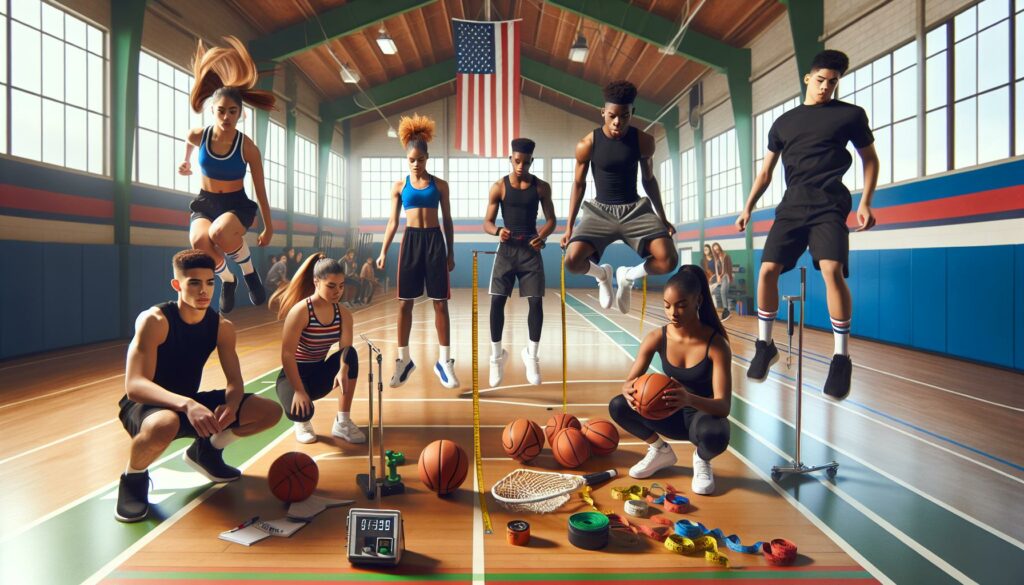I’ve helped countless students navigate their path into sports science programs and one thing’s clear – understanding the entry requirements is crucial for success. A sports science degree opens doors to exciting careers in athletics performance sports medicine and fitness management.
Getting into a sports science program requires more than just a passion for sports. As someone who’s worked closely with admissions departments I know that universities typically look for strong foundations in biology chemistry and sometimes physics. They’ll also want to see your genuine interest in human anatomy and physiology through relevant extracurricular activities or work experience.
Key Takeaways
- Most Sports Science Degree Entry Requirements is a minimum GPA of 3.0, with competitive programs seeking 3.5 or higher
- Core prerequisites include 4 years each of Math, Science, and English, with advanced coursework in Biology, Chemistry, and Physics
- Standardized test requirements typically range from 1100-1400 for SAT and 22-28 for ACT scores
- Strong athletic background and practical sports experience significantly strengthen applications
- Candidates must submit 2-3 letters of recommendation, a personal statement, and may need to complete an interview
- Alternative pathways exist for transfer students (24-30 credits, 2.75+ GPA) and international applicants (TOEFL 80+/IELTS 6.5+)
Sports Science Degree Entry Requirements
Sports science degree programs combine scientific principles with athletic performance studies to create comprehensive educational pathways for students interested in sports-related careers.
Common Program Names and Variations
Sports science degrees appear under several academic titles across different institutions:
- Bachelor of Science in Exercise Science
- Bachelor of Science in Kinesiology
- Bachelor of Arts in Sport Science
- Bachelor of Science in Human Performance
- Bachelor of Science in Athletic Training
- Bachelor of Science in Sports Medicine
These programs share core elements but offer distinct specializations:
| Program Type | Primary Focus | Key Subjects |
|---|---|---|
| Exercise Science | Body Movement | Biomechanics, Exercise Physiology |
| Kinesiology | Human Motion | Motor Control, Rehabilitation |
| Sport Science | Athletic Performance | Performance Analysis, Training Methods |
| Human Performance | Physical Optimization | Strength Training, Conditioning |
| Athletic Training | Injury Prevention | First Aid, Sports Medicine |
| Sports Medicine | Clinical Care | Injury Assessment, Treatment |
Different universities structure their programs based on specific areas of expertise:
- Research-focused programs emphasize laboratory work
- Practice-based degrees include extensive fieldwork
- Combined programs offer dual qualifications
- Specialized tracks target specific career paths
- Accelerated options complete studies in 3 years
- Co-op programs integrate paid work experience
Each variation maintains accreditation standards while providing unique educational pathways aligned with specific career goals in the sports science field.
Academic Requirements for Admission
Sports science programs maintain specific academic standards to ensure students can handle the rigorous coursework combining scientific principles with athletic performance studies.
Minimum GPA Requirements
Most accredited sports science programs require a minimum GPA of 3.0 on a 4.0 scale for admission consideration. Top-tier universities often set higher GPA thresholds of 3.5 or above, particularly for specialized tracks like pre-physical therapy or sports medicine. Early admission programs typically require a 3.7 GPA or higher to qualify for automatic acceptance.
Required High School Courses
The core prerequisite courses include:
- 4 years of Math (Algebra I II Geometry Precalculus)
- 4 years of Science (Biology Chemistry Physics)
- 4 years of English
- 2-3 years of Social Studies
- Advanced Placement (AP) or International Baccalaureate (IB) courses in:
- Biology
- Chemistry
- Physics
- Human Anatomy & Physiology
Standardized Test Scores
Test score requirements vary by institution:
| Test Type | Typical Minimum Score | Competitive Score Range |
|---|---|---|
| SAT | 1100 | 1200-1400 |
| ACT | 22 | 24-28 |
| SAT Subject Tests (Science) | 650 | 700-800 |
Some programs offer test-optional admissions pathways when applicants present strong academic records demonstrating advanced coursework achievement.
Essential Skills and Qualifications
Sports science degree programs require a combination of practical athletic experience and strong academic capabilities in scientific disciplines. These foundational elements create a comprehensive skill set for success in the field.
Athletic Background and Experience
A demonstrated involvement in sports or fitness activities strengthens applications to sports science programs. Sports participation at high school varsity level, club teams or regional competitions provides practical understanding of athletic performance principles. Certifications in personal training, sports coaching or fitness instruction add valuable credentials. Sports-related work experience including roles as team manager, coaching assistant or fitness center staff demonstrates commitment to the field.
Scientific Aptitude
Strong analytical and problem-solving abilities in science subjects form the core requirements for sports science studies. Advanced placement or honors coursework in biology, chemistry and physics indicates readiness for college-level science concepts. Laboratory experience through science fair projects or research assistantships shows practical application skills. Demonstrated proficiency in statistical analysis and research methodology through mathematics courses or independent projects supports scientific thinking capabilities.
| Required Scientific Skills | Minimum Proficiency Level |
|---|---|
| Biology Knowledge | Advanced High School/AP Level |
| Chemistry Understanding | Intermediate to Advanced |
| Physics Concepts | Basic to Intermediate |
| Mathematics/Statistics | Pre-Calculus Level |
| Research Methods | Basic Understanding |
Additional Entry Requirements
Sports science programs require supplementary documentation beyond academic qualifications to evaluate candidates comprehensively. Here’s a detailed breakdown of these requirements:
Letters of Recommendation
Most sports science programs require 2-3 letters of recommendation from academic sources or professional mentors. Academic recommendations come from science teachers, coaches or physical education instructors who can speak to specific abilities like:
- Laboratory proficiency in biology or chemistry courses
- Leadership skills demonstrated during team sports activities
- Research capabilities shown in science projects
- Dedication to physical fitness or athletic training
Personal Statement
The personal statement serves as a 500-700 word document highlighting motivations and experiences relevant to sports science. Key components include:
- Specific experiences with sports injuries rehabilitation
- Direct involvement in athletic training programs
- Research projects related to human performance
- Volunteer work in physical therapy clinics
- Connection between academic interests and career goals
Interview Process
Many prestigious sports science programs conduct interviews to assess candidate suitability. The interview format includes:
- One-on-one discussions with faculty members
- Group interviews with other candidates
- Practical demonstrations of scientific knowledge
- Questions about current sports science research
- Problem-solving scenarios related to athletic performance
| Requirement | Typical Weight | Format |
|---|---|---|
| Letters of Recommendation | 20% | Written submission |
| Personal Statement | 25% | Written document |
| Interview Performance | 30% | In-person/virtual |
| Academic Records | 25% | Transcripts |
Alternative Pathways to Admission
Sports science programs offer multiple routes for admission beyond traditional high school entry requirements. These pathways accommodate diverse educational backgrounds while maintaining academic standards.
Transfer Student Requirements
Transfer students need 24-30 completed college credits with a minimum 2.75 GPA for sports science program admission. The required coursework includes:
- Completion of foundational science courses (Biology, Chemistry) with grades of B or higher
- Introduction to Exercise Science or equivalent courses
- College-level Mathematics through Pre-Calculus
- English Composition credits
- Transfer credits from regionally accredited institutions only
| Transfer Credit Requirements | Minimum Grade | Credit Hours |
|---|---|---|
| Science Prerequisites | B (3.0) | 8-12 |
| Mathematics | C+ (2.5) | 6-8 |
| General Education | C (2.0) | 10-12 |
- TOEFL score of 80+ (internet-based) or IELTS score of 6.5+
- Academic transcripts evaluated by recognized credential services
- Proof of financial support documentation
- Student visa (F-1) eligibility verification
- Course-by-course evaluation of previous academic work
| English Proficiency Test | Minimum Score Required |
|---|---|
| TOEFL (iBT) | 80 |
| IELTS | 6.5 |
| PTE Academic | 58 |
| Duolingo English Test | 105 |
Start a Degree
Starting your journey toward a Sports Science Degree Entry Requirements careful planning and preparation. I recommend focusing on building a strong foundation in science subjects while actively participating in sports-related activities to strengthen your application.
Remember that entry requirements vary among institutions but maintaining competitive grades looking beyond just academic achievements and preparing a well-rounded application will boost your chances of acceptance. Whether you’re a high school student traditional college applicant or considering alternative pathways there’s a route available if you meet the core requirements.
I encourage you to reach out to specific programs you’re interested in to understand their unique requirements and expectations. Your dedication to both academic excellence and practical experience will set you up for success in this rewarding field.



